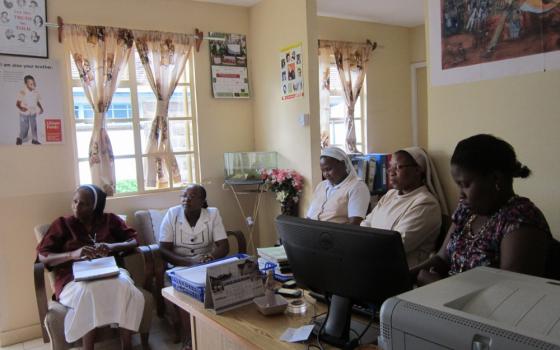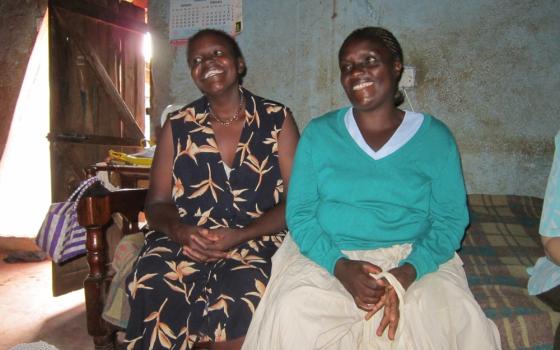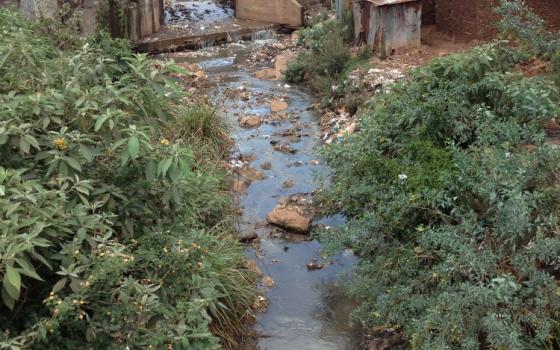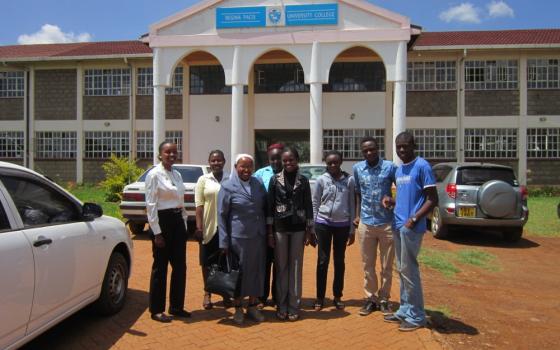In Nairobi’s traffic-clogged maelstrom, Catholic sisters go quietly about their calling, helping the dying, supporting the destitute, educating the impoverished and healing the sick.
It would be easy for them to be invisible, some 3,000 women among 3.3 million people sprawling across a highlands plateau in eastern Africa. If not for their grit. If not for their faith.
“I strike the match I was given,” said Sr. Agnes Wamuyu Ngure, “and it starts a fire that I don’t feel I control.’’
Ngure, executive secretary for the Association of Sisterhoods of Kenya, has a knack for making things happen. So she may have been speaking specifically about an innovative new project that Kenyan sisters are working on together to improve the lives of young children with HIV/AIDS.
But she was also describing a holy fire that drives sisters in ministries across Nairobi, across Africa, across the world.
We have launched Global Sisters Report, a platform for telling the stories of Catholic sisters like Agnes Wamuyu Ngure: their service, their spirituality, their constancy amid uncertainty.
It is also a forum for their individual voices on topics as seemingly disparate as contemplation and human trafficking, sisterhood and patriarchy.
And it is a place, too, that chronicles how religious life has changed and continues to change, as sisters engage the world from their mission-driven perspectives.
“Energies in the universe are converging,’’ Sr. Joyce Meyer said, “and if you notice them, things happen.’’
Meyer, a Presentation Sister and former missionary, is also the former executive director of the Conrad N. Hilton Fund for Sisters. Two years ago she and Ngure began looking for a new way to train sisters in a holistic approach to helping young children with HIV/AIDS.
And Meyer, now an international liaison with Global Sisters Report, was back in Nairobi in February, just before the new program was about to begin, reconnecting with Ngure and other Kenyan sisters and representing GSR.
The unofficial capitol of East Africa seemed like a fitting place to begin telling stories of the few affecting the many.
“Every time I speak with somebody, they give me an idea, said Ngure, a Franciscan Elizabethan sister, “and I say eish . . . where will this take me?”
Nairobi is a distinctly modern city, perhaps in too many ways.
The African home to more than 100 global companies, this “Green City in the Sun’’ boasts leafy suburbs where executives live comfortably in 10-bedroom homes on one-acre plots. The literacy rate is 83 percent, high for a continent where education is still a privilege. The climate, at 6,000 feet above sea level and astride the Equator, is peerless.
But Nairobi is also home to Kibera, Africa’s second biggest slum after Soweto in South Africa. Half the city’s population live in its slums, in dingy shacks built of laterite soil or in tiny concrete block rooms shared by two families, their lives divided by a curtain.
A small picture of Kenya’s president, Uhuru Kenyatta, adorns public spaces. The winner of a flawed election, Kenyatta is also wanted in The Hague for crimes against humanity. The African Union dealt with this by rejecting the authority of the International Criminal Court.
After the Westgate Mall terrorist attack last year, even the Lonely Planet travel website carries a warning: “Check with your government before travelling to Kenya.” A United Nations report says that one-third of the residents in the city, also nicknamed “Nairobbery,” have been robbed.
Religious women working in this jewel of East Africa report that the Kenyan road network is now so bad that its agricultural produce rots in the fields: it’s not economical to break the back of your vehicle transporting pineapples, mangoes, coffee and citrus to export hubs that serve the rest of the world.
Just off one of Kibera’s main access roads is a dilapidated gate bearing the legend Lea Toto, a pair of small houses painted a cheerful yellow that is part of a larger program that cares for children from six weeks to 18 years old who are affected by HIV/AIDS. Run by Loretto Sr. Mary Owens, it helps 3,000 children, including residents of Kibera and Mukuru, Nairobi’s two biggest slums.
No nonsense Irish, Owens strides past cesspits, scrawny chickens, unemployed men with eyes glazed over from marijuana. It is the least safe part of this dangerous city.
The poverty is difficult to describe. Tiny dark shacks, just big enough for a bed or sleeping mat, cling to the steep banks of the Nairobi River that weeps through a plastic-encrusted channel, providing the slum-dwellers with water. Alleyways are too narrow to accommodate a man’s shoulders.
Community health workers with Lea Toto, a home-based care program, live in the slums and are mostly HIV-positive; they identify children who need help. “I know all of their problems and troubles,” explained one volunteer. “I have been helped, and I want to give back.”
Trained counselors visit families and, with permission, test for HIV in their home. If the results are positive – and they often are – a clinical officer at Lea Toto will prescribe antiretroviral drugs that can slow HIV’s progress and give additional medicine for opportunistic infections.
Owens worries about aid programs that supply the nourishing food important to a successful drug therapy. Previously funded by the United Nations World Food Program, with support from an Irish charity, it fed 1,000 families. This year it passed to the Kenyan government.
A family of five waited patiently to be seen at Lea Toto. “We eat in turns,” the eldest child said. “If you have supper, you don’t get breakfast.”
Lea Toto refers children too sick to return home to a hospital or to its Nyumbani Children’s Home in Karen, an upmarket suburb west of the Central Business District. It boasts a state of-the art blood analysis laboratory, capable of testing for resistance to antiretroviral drugs in HIV-positive patients, a rarity in Kenya.
Cottages, set on a shady, tranquil estate, are grouped around a central play area. Each one has a housemother and can accommodate up to 14 children.
Little ones bang spoons on their high chairs in anticipation of lunch while the bigger boys and girls help out in the kitchen. In a quiet corner, a bundle lies under blankets that imperceptibly lift with each breath: a new arrival.
“We mix up the age groups to make it as much like a family as we can,” said Protest Lumiti, the project manager.
Lumati tries to reintegrate orphaned teenagers into their extended families, but not always successfully. Sometimes families make the orphans eat outside, for example, or work as unpaid domestic staff.
With families more unwilling to take on the burden of nieces and nephews and with grandparents growing older and less able to help, Nyumbani Village was established in 2004 about three hours east of Nairobi.
The village includes schools, community and health centers. A sustainable farm and dairy supports the project.
Nyumbani Village is home to 952 children and 100 grandparents.
“We invite elderly, destitute grandparents to come and live with us,’’ Owens said, “and in exchange we help them look after their own grandchildren and our orphans who have no place else to go.”
Empowering the weakest among them is part of the mission for Owens and Lumiti. For example, Nyumbani lends groups of five to 10 people 10,000 shillings (U.S. $115) for small business projects, and is planning to collaborate with KIVA, a U.S.-based crowd-funding platform.
Self-sufficiency pervades another HIV/AIDS program, this one run by the African Missionary Congregation of the Evangelizing Sisters of Mary, an African order founded in Uganda in 1975.
Their focus is single mothers and children, in keeping with a mission to help the most vulnerable. Sr. Mary Wambui runs the mission with 12 staff, 85 community health workers, and 1,168 volunteer caregivers. It serves 3,200 orphans and vulnerable children.
Education, training and loans are critical parts of the program. So are the “slum bags” the mission packs: 100-pound sacks – like soft flower pots – of rich compost or soil that can grow sufficient vegetables for a small family out of slits cut into the sides.
David Kimotho, who grew up in the slums and now is the mission’s project manager, sees a transformation.
“When the sisters started, we used to come to the gates to beg. Now no one begs; we have been empowered,’’ he said. “when you meet children in the slums today – well, that is the gaze of Christ.”
Justice and charity underpin the work of Incarnate Word Sr. Mary Magdalene Kanini.
Kanini leads a Justice and Peace Commission created by Njure’s Kenyan sisters’ association in 1991. The group worked initially on issues of social justice for sisters but widened to include women and children.
“We work in the background, go quietly on offering our work to God,’’ Njure said. “I think it is a bright way of evangelizing. People think sisters wake up, pray, eat, clean the house and our work is over. But this is not so.”
“Sisters have come out and spoken and condemned injustices through our office.”
With 330 regional coordinators trained and monitored by the commission, it helps women and children know their rights, improves school discipline and facilitates truth and reconciliation.
The commission also helps sisters with property issues and supports anyone who has been abused.
“Sisters have emotional and psychological problems,” Kanini said. “Mostly we educate them as to what to do if something happens to them and what their rights are.”
And women who were part of a gender-equality program started in 1997 now hold government positions, and some have run for office in the last elections, she said.
“We run train-the-trainers’ courses to spread the word, and we do lots of advocacy with other human rights’ organizations.”
The commission’s peace clubs in schools gained relevance when human rights’ topics were introduced into the Kenyan curriculum. It remains sensitive to emerging issues, including the importance of children understanding their rights.
“Last November a girl who is a member of one of our peace clubs was stopped from writing her final exam because she was pregnant, and she spoke up to her family and human rights’ teacher about it,” explained a commission staff person.
The principal was removed, and the student graduated.
National and international congregations agree that education is a key to their future. This is not a view shared by everyone: Some people say that since sisters evangelize among the poor they don’t require education or professional skills.
Assumption Sr. Marie Theresa Gacambi, who holds a doctorate in theological studies, decided to change this.
Already dean of theology at the Catholic University of Eastern Africa, she believed that Kenya needed a graduate school of nursing. She identified donors in the United States who wanted to send funds to a recognized entity.
“I went to see a priest in a well-established congregation and said that my U.S. friends wanted to send me money to start a nursing university college. But it is complicated,’’ she recalled saying. “Can we use your organization to receive it, please?”
“He asked me if I was mad and if I knew what was involved in running a university . . . .
“Yes, I was mad – with Christ’s passion. I left, stopped the car and prayed. ‘Jesus, what do you want? How can we be looked down on like this?’ Within me I heard: ‘Go ahead.’ I went back to the college trustees. I didn’t want to tell the story. I just said ‘I think we will be OK.’ ”
It worked.
“If you have the vision,” Gacambi said, “the money comes in. Of course you need a plan and organizational structures – but education is the greatest thing you can give a person.”
Gacambi’s vision stands foursquare at Regina Pacis University College, which offers several degree and certificate programs. This handsome edifice of grey granite opened in 2010 with 12 students who will graduate later this year with a Bachelor of Science degree in nursing.
“We don’t have scholarships, but every year we take two or three orphans from the slums,” Gacambi said. “A small part of the fees paid by the majority of students goes to help the vulnerable children and orphans to study.”
In 2012 the Kenyan government passed a law requiring that colleges like Regina Pacis become fully-fledged universities or close down. In an extraordinary meeting in November, the board of trustees decided to go for broke.
“We didn’t want our students to be marginalized and unable to find employment,” explained Sr. Dr. Justina Ndaita, the school’s new principal.
[Jill Day is a contributing writer and editor from Harare, Zimbawe.]
Related - Nairobi sisters up close






